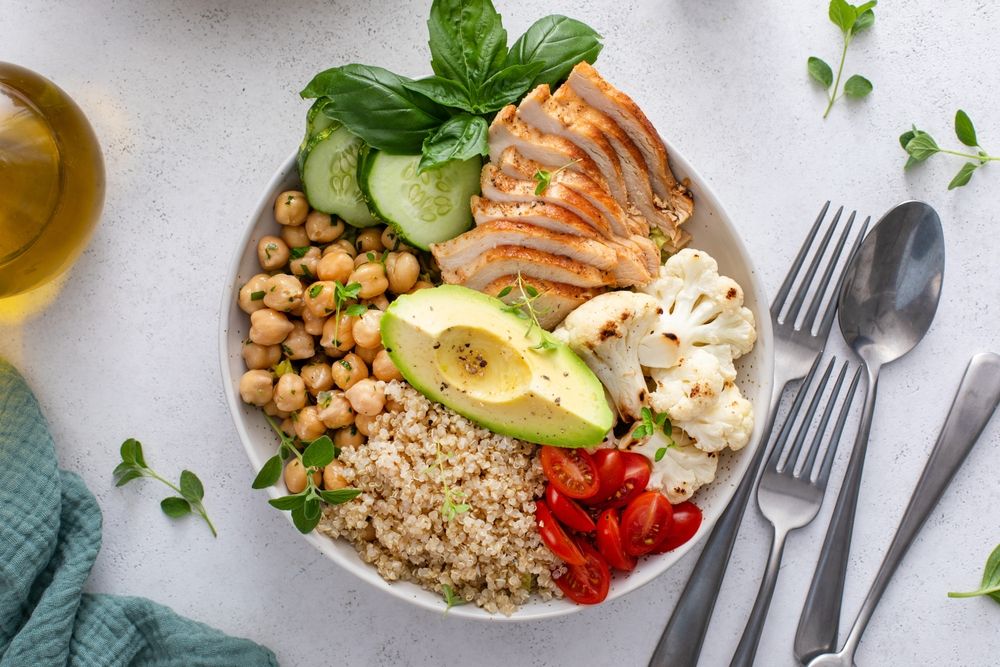Aging is an inevitable part of life, but more and more research shows we can influence how gracefully we age—and it’s not just about using the right creams or staying out of the sun. Our daily food choices may be one of the most powerful ways to support the body’s natural defenses against age-related decline. Through a balanced anti-aging diet, you can help protect cells from oxidative stress, reduce inflammation, and give your body the essential nutrients it needs to function at its best. This guide explores key dietary strategies and foods believed to help slow down the aging process, so you can look and feel healthier as the years roll on.
1. Focus on Whole, Nutrient-Dense Foods
Why It Matters
One of the fundamental principles of any longevity-focused diet is emphasizing whole, minimally processed foods. These options typically retain more vitamins, minerals, antioxidants, and fiber than their ultra-processed counterparts.
Key Principles
- Choose Whole Grains: Brown rice, quinoa, oats, and other whole grains offer fiber, B vitamins, and various phytonutrients that support healthy aging.
- Favor Fresh Vegetables and Fruits: Colorful produce—like berries, leafy greens, broccoli, peppers—delivers antioxidants that combat oxidative stress, a major contributor to cellular aging.
- Incorporate Lean Proteins: Whether you prefer fish, poultry, beans, or tofu, quality protein helps maintain muscle mass and support tissue repair.
- Healthy Fats: Avocados, nuts, seeds, and extra-virgin olive oil supply monounsaturated and polyunsaturated fats linked to better heart health and reduced inflammation.
Takeaway: The anti-aging diet starts with prioritizing fresh, minimally processed foods that feed your cells with the nutrients they need to thrive.
2. Harness the Power of Antioxidants
Why It Matters
Free radicals—unstable molecules that can damage cells—play a major role in aging and chronic disease. Antioxidants neutralize these free radicals, helping mitigate cellular harm over time.
Top Antioxidant Sources
- Berries: Blueberries, strawberries, raspberries, and blackberries are loaded with anthocyanins and vitamin C, both associated with protective effects on the brain and cardiovascular system.
- Dark Leafy Greens: Spinach, kale, and Swiss chard contain vitamins A and C, plus plant compounds like lutein, which may support eye health.
- Nuts and Seeds: Almonds, walnuts, sunflower seeds—these deliver vitamin E, which combats oxidative stress and supports skin health.
- Green Tea: Rich in catechins, green tea may help reduce inflammation and support metabolic health.
- Dark Chocolate (70% or higher cacao): Cocoa flavanols contribute to cardiovascular benefits—just keep portions moderate.
Takeaway: Incorporate antioxidant-rich foods daily. A bowl of berries in the morning, a leafy green salad at lunch, and a few squares of dark chocolate in the evening can all support your body’s anti-aging efforts.
3. Prioritize Anti-Inflammatory Fats
Why It Matters
Chronic low-grade inflammation is considered a driver of aging and age-related diseases. Balancing your intake of omega-3, omega-6, and omega-9 fatty acids can help keep inflammation in check.
What to Focus On
- Omega-3-Rich Foods: Fatty fish (salmon, sardines, mackerel), walnuts, chia seeds, flaxseeds, and algae-based supplements. Omega-3s are tied to better heart health, improved cognitive function, and a reduction in chronic inflammation.
- Moderate Omega-6: While we need some omega-6 fatty acids (found in many vegetable oils), excessive amounts relative to omega-3s can promote inflammation. Use oils like extra-virgin olive oil (high in omega-9) and limit highly processed oils.
- Olive Oil and Avocado Oil: These are rich in monounsaturated fats that can help maintain healthy cholesterol levels and curb inflammation.
Takeaway: Strive for balanced fats, leaning heavily on omega-3 sources, moderate consumption of monounsaturated fats, and a reduction in excess omega-6 from refined seed oils.
4. Embrace Low-Glycemic Eating
Why It Matters
Excess sugar intake can lead to spikes in blood sugar and insulin, fostering glycation—where sugar molecules bind to proteins and lipids, impairing their function. Glycation is linked to wrinkles, organ damage, and accelerated aging.
Strategies
- Limit Refined Carbs: White bread, pastries, sugary cereals, and other ultra-processed carbs trigger blood sugar surges.
- Choose Complex Carbs: Whole grains, beans, and legumes break down more slowly, promoting stable energy and fewer insulin spikes.
- Manage Portion Sizes: Even healthy carb sources can cause sugar spikes if you overeat. Pair them with proteins and fats for a balanced meal.
- Opt for Natural Sweeteners, In Moderation: Honey, maple syrup, and fruit-based sweeteners may be less processed but can still elevate blood sugar if consumed excessively.
Takeaway: Keeping blood sugar under control not only supports energy and weight management but may also help slow the aging effects of glycation.

5. Consider Intermittent Fasting or Calorie Restriction
Why It Matters
Research suggests that controlled calorie restriction and certain fasting patterns can trigger cellular repair pathways and reduce oxidative stress. While these approaches aren’t for everyone, they’re gaining attention in the longevity community.
Options
- Time-Restricted Eating (TRE): Confine food intake to a shorter window each day (e.g., 8–10 hours). This allows your body a longer overnight fasting period, supporting metabolic health.
- Intermittent Fasting (16:8, 5:2, etc.): Varying methods revolve around short fasting intervals or days of significantly reduced calorie intake.
- Calorie Restriction (CR): Consistently eating below typical energy requirements by a modest percentage. Long-term CR must be well-planned to avoid nutrient deficiencies.
Takeaway: If you explore fasting or calorie restriction, ensure you do so responsibly—sufficient protein, healthy fats, and micronutrient intake are vital to maintaining muscle mass and overall health.
6. Spice Things Up with Herbs and Seasonings
Why It Matters
Herbs and spices do more than add flavor. Many boast potent anti-inflammatory and antioxidant properties, making them valuable allies in an anti-aging diet.
Spices to Consider
- Turmeric/Curcumin: Often lauded for anti-inflammatory effects—pair with black pepper to enhance absorption.
- Ginger: Known to aid digestion and combat inflammation.
- Garlic: Rich in sulfur compounds that may help cardiovascular health and immune support.
- Cinnamon: Linked to better blood sugar regulation when consumed in moderate amounts.
Takeaway: Incorporate fresh or dried herbs and spices into your meals regularly. They can turn simple dishes into anti-aging powerhouses.
7. Hydration and Gut Health
Why It Matters
Your digestive system is home to trillions of bacteria affecting everything from immunity to brain function. Supporting a balanced gut microbiome and staying well-hydrated can positively impact aging.
Action Steps
- Water Intake: Aim for at least 8 glasses a day, adjusting for activity levels and climate. Proper hydration supports skin elasticity, circulation, and detoxification.
- Fiber-Rich Foods: Whole grains, legumes, fruits, and veggies feed beneficial gut bacteria.
- Probiotics and Fermented Foods: Yogurt, kefir, kimchi, sauerkraut, and other fermented products deliver beneficial bacteria that can reinforce gut integrity.
- Avoid Excess Antibiotic Use: If possible, limit unnecessary antibiotic treatments or overuse of antibacterial products that can disrupt gut flora.
Takeaway: A hydrated body and a nourished gut microbiome create a strong foundation for overall health and longevity.
8. Lifestyle Factors Beyond Diet
Why It Matters
No diet alone can fend off aging if other aspects of a healthy lifestyle are neglected. Diet is crucial, but synergy with exercise, stress management, and sleep makes the biggest difference.
Holistic Support
- Regular Exercise: Resistance training helps maintain muscle mass, while cardio supports heart health and circulation.
- Quality Sleep: Adequate rest is when the body repairs cells, clears metabolic waste from the brain, and regulates hormones.
- Stress Reduction: Chronic stress speeds aging through elevated cortisol. Mindfulness, meditation, or leisure activities help keep stress in check.
- Avoid Excessive Alcohol and Smoking: Both can cause oxidative damage and accelerate aging markers.
Takeaway: Combine an anti-aging diet with a well-rounded lifestyle—enough physical activity, restful sleep, and stress management—for the greatest benefit.
Slowing the aging process isn’t about defying nature—it’s about supporting the body’s resilience and vitality through mindful choices. An anti-aging diet centers on antioxidant-rich produce, balanced fats, low-glycemic carbohydrates, and sufficient protein to maintain muscle and organ function. Incorporating proven spices like turmeric and ginger, drinking enough water, and maintaining a healthy gut all further reinforce the body’s protective mechanisms.
While these dietary habits form a powerful base, they shine brightest when paired with a balanced lifestyle that includes regular exercise, adequate rest, and stress management. By cultivating habits that reduce inflammation and oxidative stress, you give your body the best chance at aging gracefully. It’s not about quick fixes or extreme regimes—rather, it’s about steady, nourishing practices that keep you feeling energetic, robust, and youthful from the inside out.





